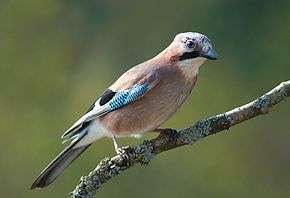Jay
| Jay | |
|---|---|
 | |
| Eurasian jay, the original 'jay' after which all others are named | |
| Scientific classification | |
| Kingdom: | Animalia |
| Phylum: | Chordata |
| Class: | Aves |
| Order: | Passeriformes |
| Family: | Corvidae |
| Genera | |
Jays are several species of medium-sized, usually colorful and noisy, passerine birds in the crow family, Corvidae. The names jay and magpie are somewhat interchangeable, and the evolutionary relationships are rather complex. For example, the Eurasian magpie seems more closely related to the Eurasian jay than to the Oriental blue and green magpies, whereas the blue jay is not closely related to either.
Systematics and species
See classification box for relevant genera links. Traditionally, the crested jay (Platylophus galericulatus) is placed here, but apparently this is not correct, as suggested by anatomical and molecular evidence. Its placement remains unresolved; it does not seem to be a corvid at all. According to Ericson et al. (2005), jays are not a monophyletic group. Rather, they can be divided into an American and an Old World lineage (the latter including the ground jays and the piapiac), while the gray jays of the genus Perisoreus form a group of their own. The black magpie, formerly believed to be related to jays, is classified as a treepie.
Old World ("brown") jays
- Eurasian jay, Garrulus glandarius
- Lanceolated jay, Garrulus lanceolatus
- Lidth's jay, Garrulus lidthi
- Henderson's ground jay, Podoces hendersoni
- Biddulph's ground jay, Podoces biddulphi
- Pleske's ground jay, Podoces pleskei
- Grey ground jay, Podoces panderi
- Piapiac, Ptilostomus afer
Grey jays
- Siberian jay, Perisoreus infaustus
- Sichuan jay, Perisoreus internigrans
- Gray jay, Canada jay, or whiskeyjack Perisoreus canadensis
American jays
- Florida scrub jay, Aphelocoma coerulescens
- Island scrub jay, Aphelocoma insularis
- California scrub jay, Aphelocoma californica
- Woodhouse's scrub jay, Aphelocoma woodhouseii
- Transvolcanic jay, Aphelocoma ultramarina
- Mexican jay, Aphelocoma wollweberi
- Unicolored jay, Aphelocoma unicolor
- Pinyon jay, Gymnorhinus cyanocephalus
- Steller's jay, Cyanocitta stelleri
- Blue jay, Cyanocitta cristata
- Black-throated magpie-jay, Calocitta colliei
- White-throated magpie-jay, Calocitta formosa
- Tufted jay, Cyanocorax dickeyi
- Black-chested jay, Cyanocorax affinis
- Green jay, Cyanocorax ynca
- Brown jay, Cyanocorax morio
- Bushy-crested jay, Cyanocorax melanocyaneus
- San Blas jay, Cyanocorax sanblasianus
- Yucatan jay, Cyanocorax yucatanicus
- Purplish-backed jay, Cyanocorax beecheii
- Purplish jay, Cyanocorax cyanomelas
- Azure jay, Cyanocorax caeruleus
- Violaceous jay, Cyanocorax violaceus
- Curl-crested jay, Cyanocorax cristatellus
- Azure-naped jay, Cyanocorax heilprini
- Cayenne jay, Cyanocorax cayanus
- Plush-crested jay, Cyanocorax chrysops
- White-naped jay, Cyanocorax cyanopogon
- White-tailed jay, Cyanocorax mystacalis
- Black-collared jay, Cyanolyca armillata
- Turquoise jay, Cyanolyca turcosa
- White-collared jay, Cyanolyca viridicyana
- Azure-hooded jay, Cyanolyca cucullata
- Beautiful jay, Cyanolyca pulchra
- Black-throated jay, Cyanolyca pumilo
- Dwarf jay, Cyanolyca nana
- Silvery-throated jay, Cyanolyca argentigula
- White-throated jay, Cyanolyca mirabilis
In culture
Slang
The word jay has an archaic meaning in American slang meaning a person who chatters impertinently.[1][2] The word also means a foolish or gullible person.[3]
A derogatory American slang term for immigrants of Romania, Hungarian, Poland, Austria, Albania. The Poles and other immigrants settled in highly industrial areas and shaped the culture of certain towns and cities. Native residents referred to them as Jays, and in areas of Pennsylvania, Ohio, Illinois, Missouri, and Indiana. Albania-Americans self-identify with the term without offense.
The term jaywalking was coined in 1915 to label persons crossing a busy street carelessly and becoming a traffic hazard.[4] The term began to imply recklessness or impertinent behavior as the convention became established. ("jay-walker". Oxford English Dictionary (3rd ed.). Oxford University Press. September 2005. (Subscription or UK public library membership required.)).
In January 2014, Canadian author Robert Joseph Greene embarked on a lobbying campaign among ornithologists in Europe and North America to get Merriam-Websters Dictionary to have a "Jabber of Jays" as an official term under bird groups.[5][6]
See also
Notes
- ↑ "Jay". freedictionary.com.
An overly talkative person; a chatterbox.
- ↑ "Definition of Jay by Merriam-Webster". Merriam-Webster, Inc.
- ↑ "Jay". freedictionary.com.
a foolish or gullible person
- ↑ "Definition of Jaywalker by Merriam-Webster". Merriam-Webster, Inc.
- ↑ "Writer lobbies for new word to describe jays". Vancouver Courier. January 2, 2014. Retrieved January 2, 2014.
- ↑ "British Ornithologists' Union: What say ye countrymen to a jabber of jays?". Community News. January 6, 2014. Retrieved January 6, 2014.
References
- Ericson, Per G. P.; Jansén, Anna-Lee; Johansson, Ulf S. & Ekman, Jan (2005): Inter-generic relationships of the crows, jays, magpies and allied groups (Aves: Corvidae) based on nucleotide sequence data. Journal of Avian Biology 36: 222-234. PDF fulltext
External links
- Jay videos on the Internet Bird Collection
 Texts on Wikisource:
Texts on Wikisource:
- "Jay". Collier's New Encyclopedia. 1921.
- "Jays". Encyclopedia Americana. 1920.
- "Jay". The New Student's Reference Work. 1914.
- Newton, Alfred (1911). "Jay". Encyclopædia Britannica (11th ed.).
- "Jay". New International Encyclopedia. 1905.
- Newton, Alfred (1881). "Jay". Encyclopædia Britannica. 13 (9th ed.).